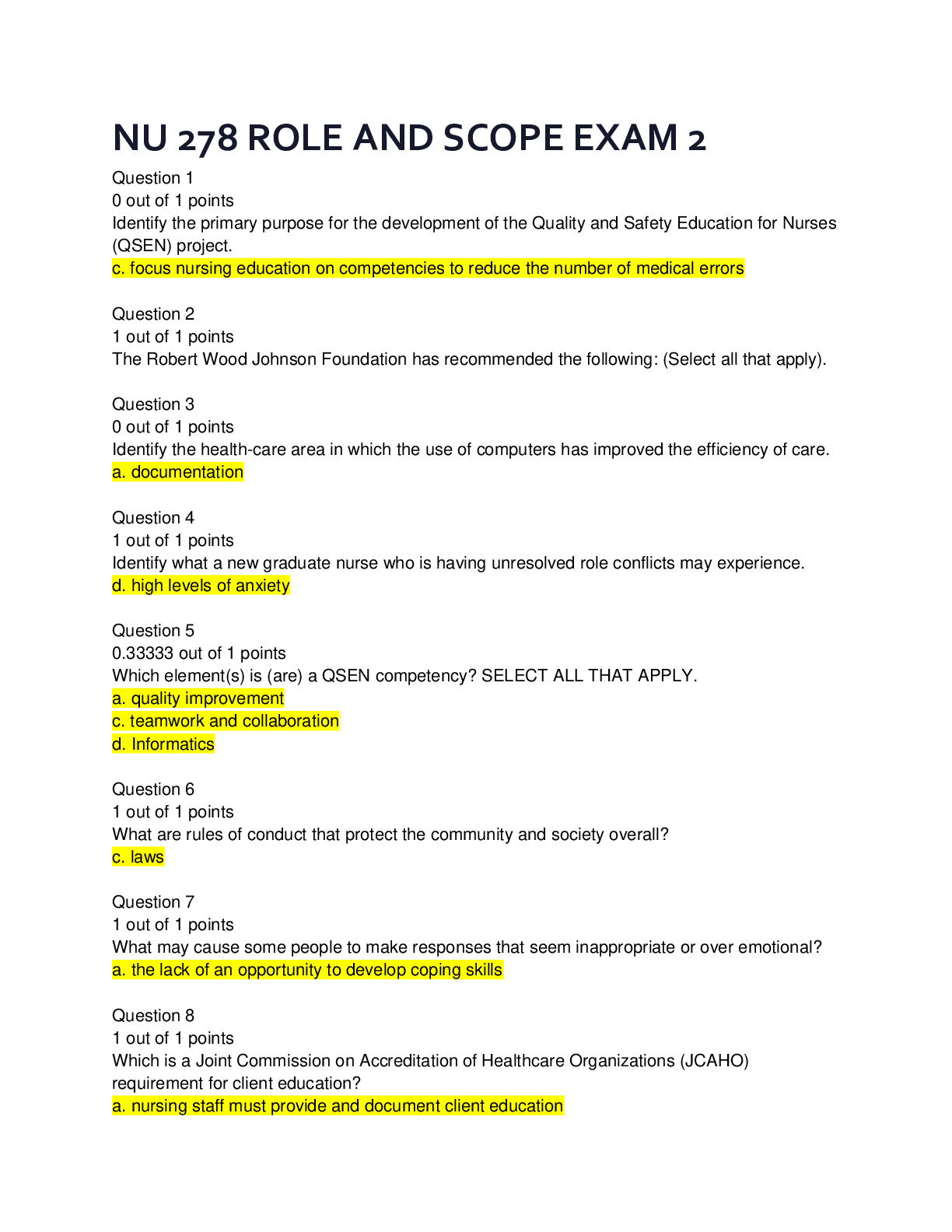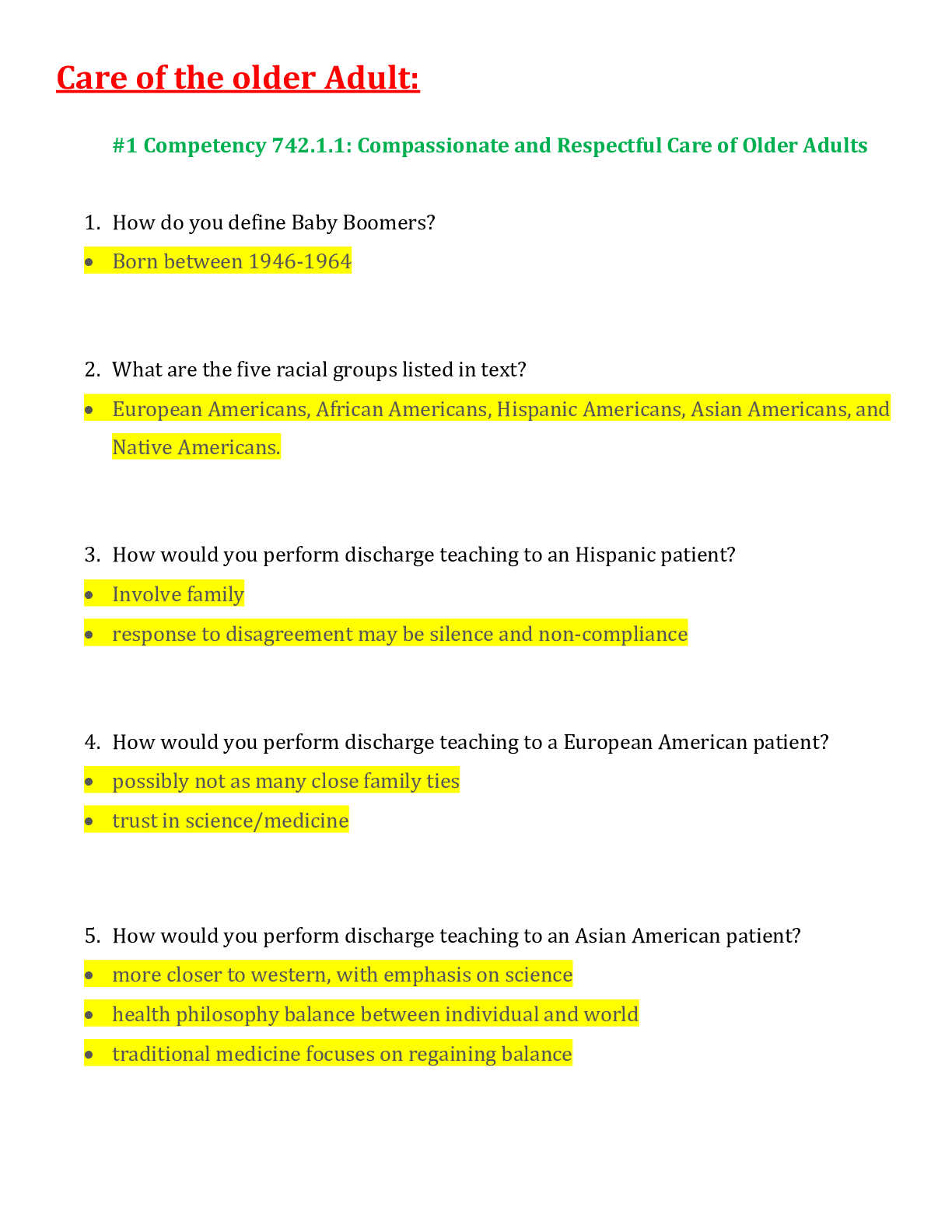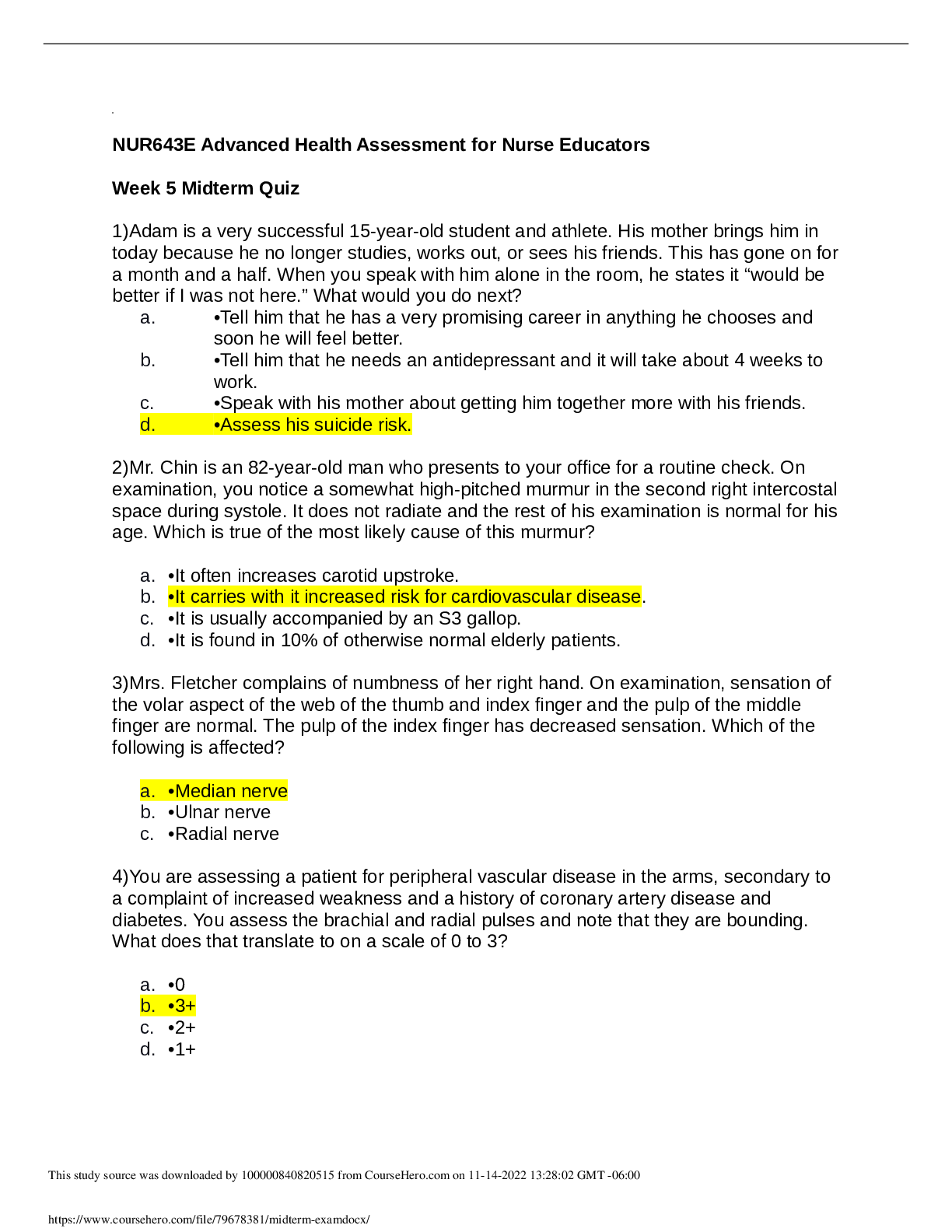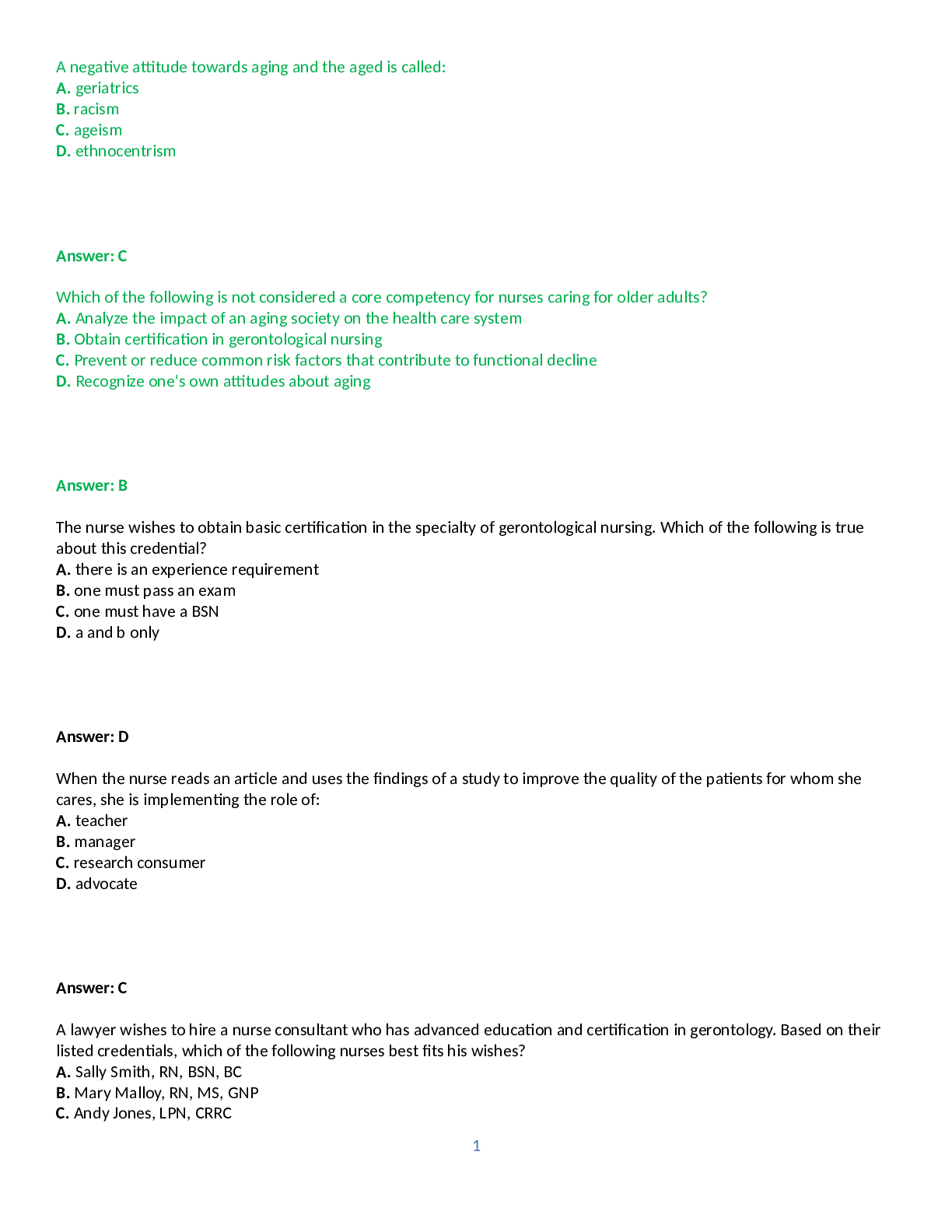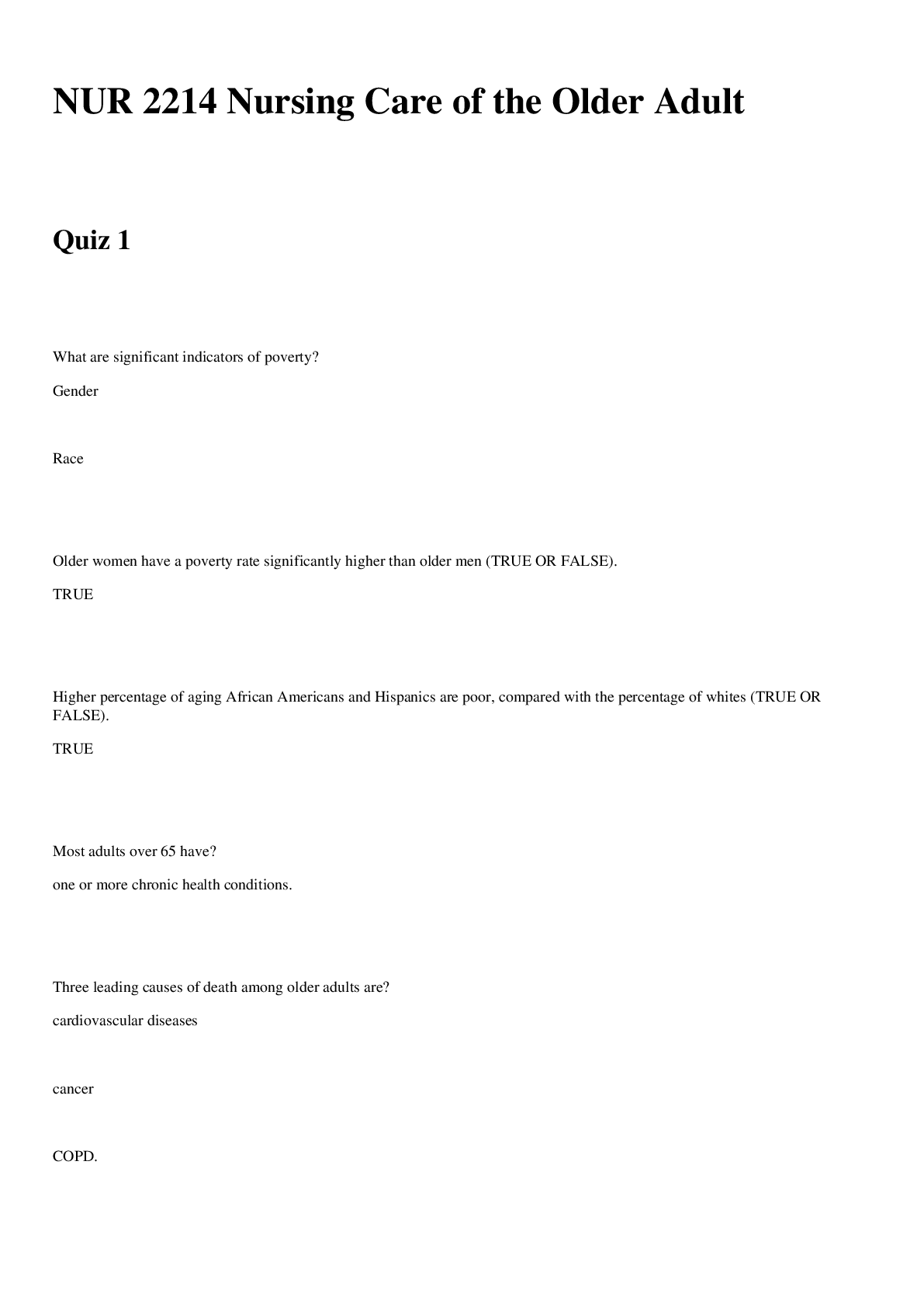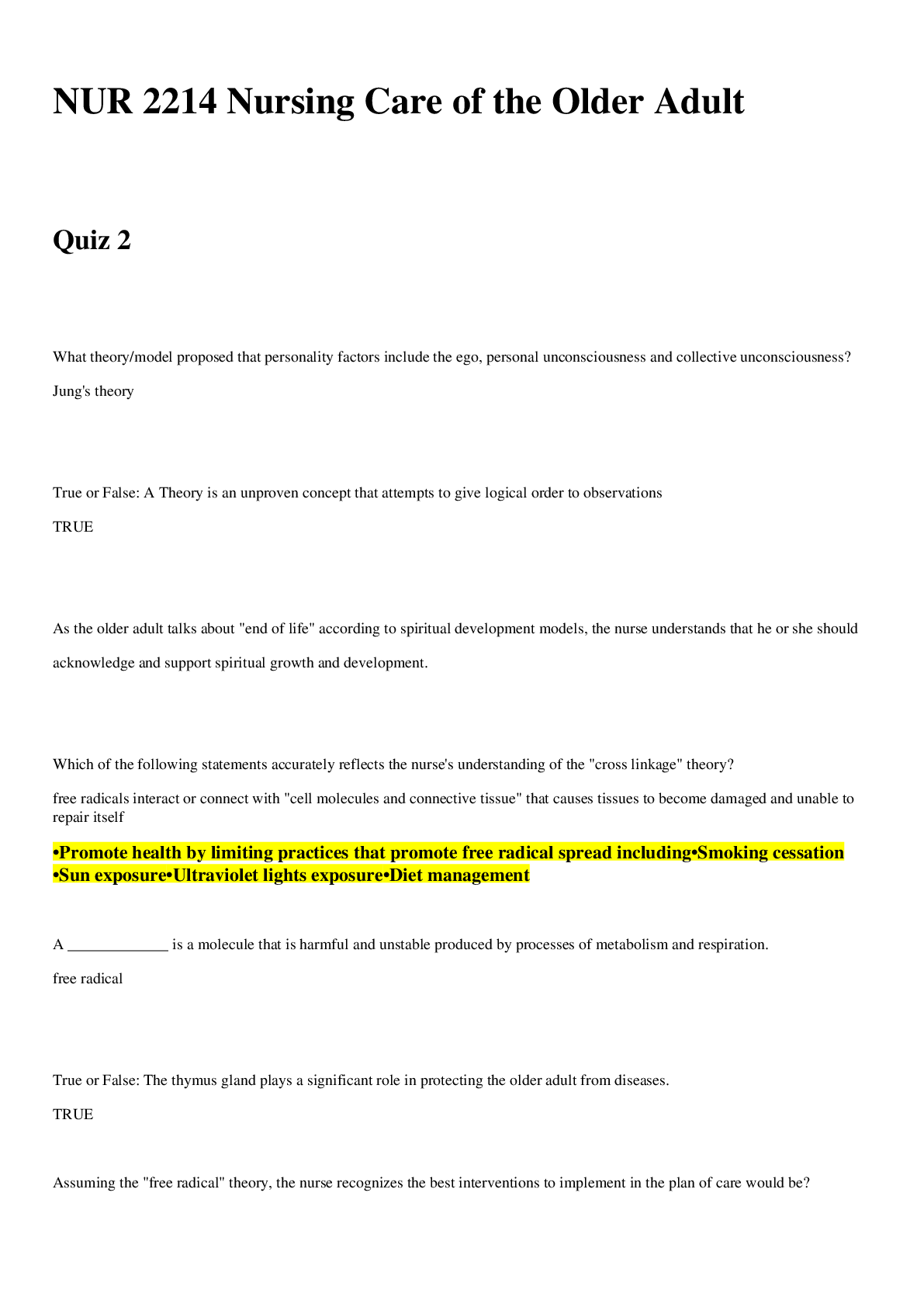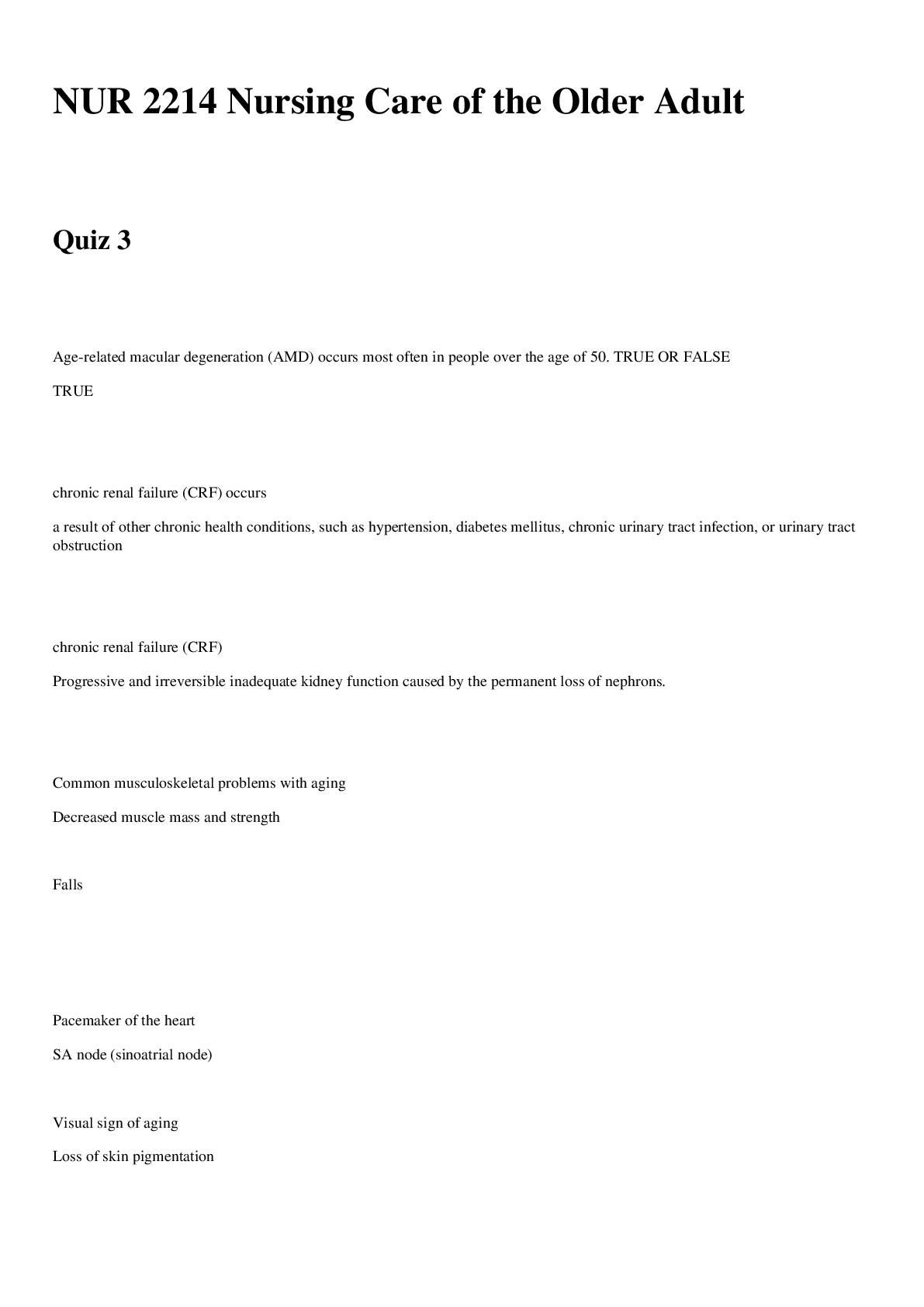*NURSING > EXAM > NURSC475 Care of the older adult: Loss, grief quiz 5 | Latest fall 21/22 | Already GRADED A. (All)
NURSC475 Care of the older adult: Loss, grief quiz 5 | Latest fall 21/22 | Already GRADED A.
Document Content and Description Below
Loss, grief quiz 5 John is a 70-year-old male whose wife died from COPD two months ago. They were very close, married for 52 years, and had no children. He comes by the nursing unit to bring you all c... andy and a thank you note for all the times you cared for her the past year. He tells you he is struggling to want to eat since she always was the cook, and is just not ready to go out to dinner with his buddies, even though they keep asking him. Your assessment is that John is: A Experiencing normal grief after his wife died two months ago B Depressed because he doesn't want to go out with his buddies C At high risk for complicated grief because his wife died in the hospital D Is doing poorly alone at home because he is not eating well and needs counseling You are caring for a number of patients and family members who are facing loss or death. In speaking with them about grief, you correctly convey that grief: A Is an orderly process with predictable stages of work to be done B Begins before a loss or death, as people consider a pending loss C Lasts a year or less, at which time survivors should be able to move on D Includes personal feelings that are universal and understood by everyone Which of the following family members is at greatest risk for complicated grief? A The wife of 60 years who has provided care for three years to her husband with Alzheimer's disease. B The son who lives out of town and has only been able to see his dad once a week for the past six months. C The female partner of a woman whose family has embraced her as family. D The daughter who has a long history of substance use and has just recently returned home to be at her dying mother's bedside. You are talking with the staff on your unit about the emotional challenges of working with dying patients and their families. Which of the following is an appropriate response to the grief the staff has been experiencing recently? A Avoid talking about the recent deaths, focusing on the patients who have survived. B Seek the support of the family of the dying patient to comfort the staff. C Share with the staff that personal grief should not be expressed by healthcare professionals. D Consult with the hospital chaplain or spiritual care counselor for staff support. You are making a bereavement visit to the 35-year-old daughter and primary caregiver of a female patient who died three months ago. The daughter reports she is experiencing mild breathlessness, loss of appetite, and difficulty concentrating. You should recognize that the daughter is experiencing:A A normal grief reaction B A complicated grief reaction C An abnormal grief reaction D A dysfunctional grief reaction A year after the loss of her son to suicide, Mrs. Phelps expresses to you that she is still terrified that her surviving son will also commit suicide. Mrs. Phelps reports continuing to have nightmares in which this happens. What type of grief is Mrs. Phelps experiencing? A Normal grief B Delayed grief C Exaggerated grief D Masked grief The hospice interdisciplinary team is creating a bereavement plan for the family of Mr. A, a 50-year-old patient with advanced HIV/AIDS. The patient defines his family as consisting of his partner, his parents, four siblings, as well as his two closest friends. In creating the plan, each member of the interdisciplinary team understands that bereavement interventions must: A Focus mainly on the patient's parents and siblings. B Include a referral to a bereavement support group or spiritual support group. C Take into account each survivor's cultural practices in mourning and grief reactions. D Occur at regular intervals for the initial six months after the death of the patient. You are assessing Mrs. Smith's husband's well-being during Mrs. Smith's recent hospitalization. He tells you he has had trouble with heart failure this past year and then says, "All that matters is my wife. I don't have time to go to my doctor even though my prescriptions have run out. Don't you realize how many medications I have to give my wife around the clock? I can't deal with any more medications. I will have time to take care of myself later on." Your best response is: A "I understand. Your wife certainly requires a lot of care and it is so hard to keep track of all her medications, let alone your own." B "I am concerned about you too. Keep in mind you can't take care of Mrs. Smith if you get sick; you need to get your prescriptions filled." C "That is nonsense; don't you know that not taking your heart failure medications could put you in the hospital?" D "Later on may never come if you don't take care of yourself now; you have to take better care of yourself and get your medications filled."You and your nurse colleagues on your unit have all been talking about how hard it is in the ICU to see so many patients who have stated they didn't want any more aggressive treatment be admitted to the ICU. You found one of your colleagues was crying in the bathroom stating, "I can't stand this anymore – I just admitted another patient who told me last time he never wanted to come back here." Your best intervention is to A Comfort her and tell her you all feel that way but it will be ok. B Listen to her and suggest you both talk with the ICU manager about the unit needing the chaplain or psychiatric nurse liaison for emotional support. C Tell her you are here for her and the two of you will get through this together. D Suggest that if she really can't stand it anymore, maybe she should consider changing jobs. You are caring for a 55-year-old female patient with metastatic breast cancer. During a home visit, you find the patient's 22-year-old daughter weeping at the kitchen table. The daughter explains that she just realized that her mother will not be alive when she gets married or has children of her own. Recognizing anticipatory grief in the young woman, the best first intervention is A Educate about signs and symptoms of disease progression. B Foster hope by stressing that prognosis is difficult to predict. C Provide active listening and therapeutic presence. D Advise the daughter to focus more on the present time with her mother rather than the future. You are caring for a 65-year-old male patient who has just died. In planning for follow-up bereavement care, which person is at risk for disenfranchised grief? A The daughter who lives in a different state B The son who was with the patient when he died C The ex-wife of the patient who lives nearby D The 16-year-old grandchild of the patient Mr. C, whose wife of 14 years died five months ago, returns to your unit to thank you all for your great care. He states, "I still can't get through a week without crying sometimes. I know I should be at least starting to move on a bit." Your best response would be: A "Most people find it takes six months before things get back to normal." B "It is still so soon after your wife's death; I am sure you will be feeling better soon." C "This is very hard; can you tell me a bit about what moving on means to you?" D "Perhaps you would like to have individual counseling for more intensive therapy." You are talking with the wife of a patient who died recently. Which statement can you make that would be most helpful?A "I know exactly how you are feeling." B "It must be hard to accept that this has happened." C "His suffering is over. He's in a better place now." D "I'm here for you. Call me if you need anything." Mr. C's family tells you they are very worried about his granddaughter who is 13 years old. She has lived with her mother and grandparents since she was three and seems to be having a hard time accepting that her grandfather is near end of life. The granddaughter is acting out in school, not doing her homework, and has been bullying friends. Mr. C has end-stage heart failure and will be discharged home tomorrow with home hospice care. What should you say to Mr. C's family regarding his granddaughter? A "Don't worry, this is probably just a phase she is going through because she sees you all are sad and upset. She will get over it with time." B "I would recommend you schedule an appointment with the pediatrician as soon as possible; it sounds like something is seriously wrong with her since she is acting out like this." C "Some children display a change in their behavior when they are experiencing grief. Would you like me to contact our child life worker to speak with you today?" D "It sounds like Mr. C's granddaughter is looking for attention and needs to be disciplined for her difficult behavior." The parents of a 2-year-old child who is dying from leukemia tell you they are so afraid that they will forget who their child was years after he dies. How should you respond? A "Don't worry, you will always remember him and will never forget him." B "There is little that can be done now that he is actively dying, but I am here with you." C "Would you like me to call our child life team who can help you with some memory making activities?" D "Have you taken any pictures of him so that you can look back at them in years to come?" You are speaking with the sister of a male patient who died after suffering fatal injuries in a car accident. In order to plan for bereavement follow-up for the patient's family, it is important that you assess: A The family support system B If the sister can take a month off from work to grieve sudden death C If the patient qualified for hospice services before the accident D Whether the patient had an advance directive You are providing bereavement support to an 8-year-old child whose father just died on your unit. Which of the following statements would be appropriate for you to use? A Use the phrase "your father has gone away" rather than "your father has died."B Tell him he will get over the loss of his father when he gets a little older. C Let him know his father's death was peaceful and that he "just went to sleep." D Let him know you wish that his father had not died. You have been working on the end-stage heart failure unit for eight months. Many of your patients have died awaiting transplant. You are aware that you are not sleeping well at night and dread going to work each day. Many of your colleagues are irritating you and you are moody when at home. Which of the following would be best to do first? A Start looking on the jobs board for a transfer to another unit. B Take up yoga and enroll in daily Pilates classes for more exercise. C Acknowledge that these are normal feelings when you have only been working for eight months. D Speak with your nurse manager about how you are feeling and ask for help. You are caring for a patient with end-stage liver disease. He tells you that he knows he only has a few weeks to live and is so sad that he won't be around to see his daughter graduate next year from college. You listen attentively and then respond: A "Would it be helpful to write a letter to her or a card that can be given on that special day?" B "Let's hope you will be here; no one ever really knows when the final days are near." C "I am so sad for you; I would hate if my dad couldn't come to my graduation." D "I am sure your daughter will understand that you wished you would be there." Which of the following demonstrates good self-care that may help you in preventing compassion fatigue and burnout when taking care of many patients with serious illness and their families? A Establish healthy eating, sleeping, and exercise habits especially when rotating shifts. B Volunteer for extra shifts to cover your overworked colleagues. C Ask to take care of all the very ill patients and families because you have the expertise many of your colleagues don't have. D Make sure you go to every funeral and service for all the deceased patients you have cared for. [Show More]
Last updated: 1 year ago
Preview 1 out of 5 pages

Buy this document to get the full access instantly
Instant Download Access after purchase
Add to cartInstant download
We Accept:

Reviews( 0 )
$5.00
Document information
Connected school, study & course
About the document
Uploaded On
Oct 30, 2021
Number of pages
5
Written in
Additional information
This document has been written for:
Uploaded
Oct 30, 2021
Downloads
0
Views
27

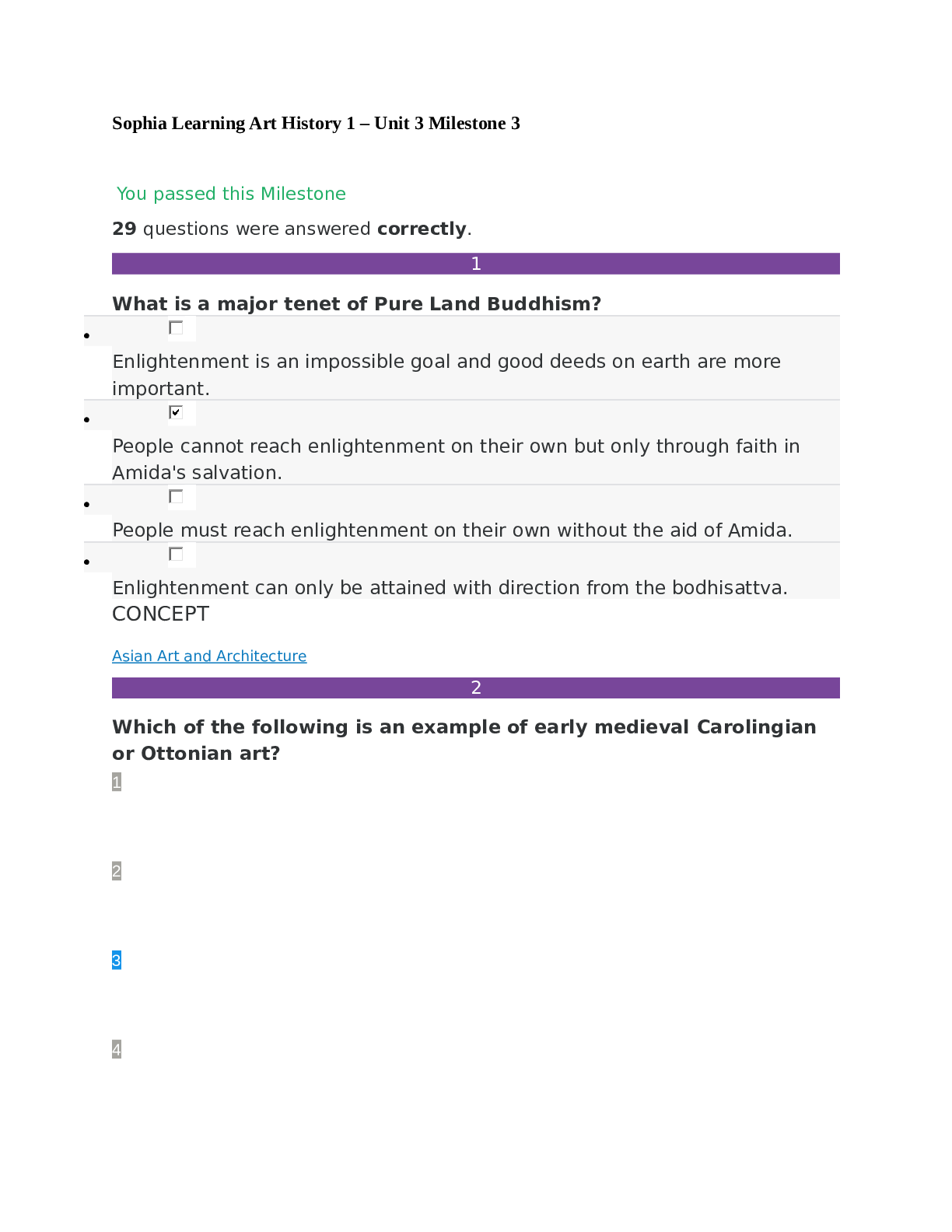
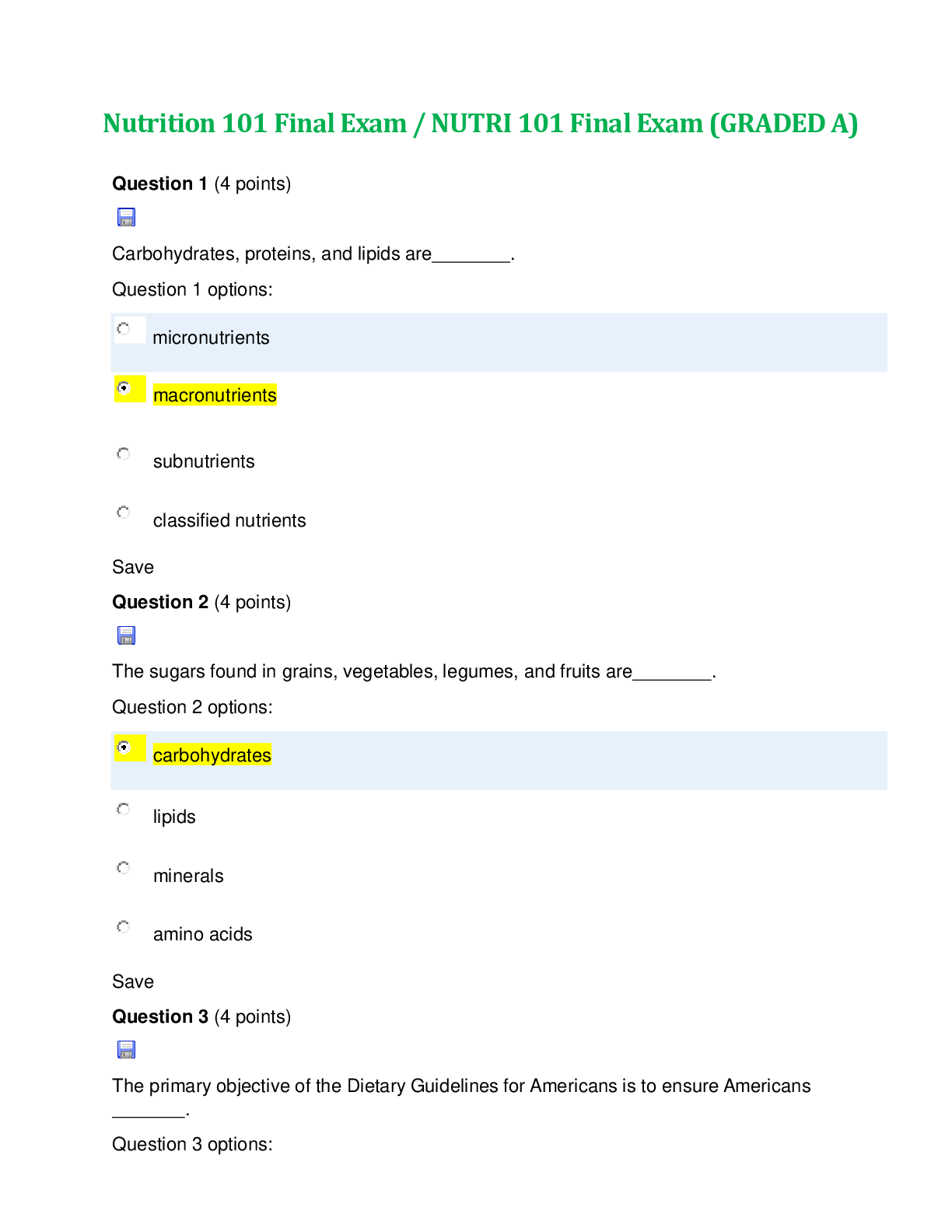
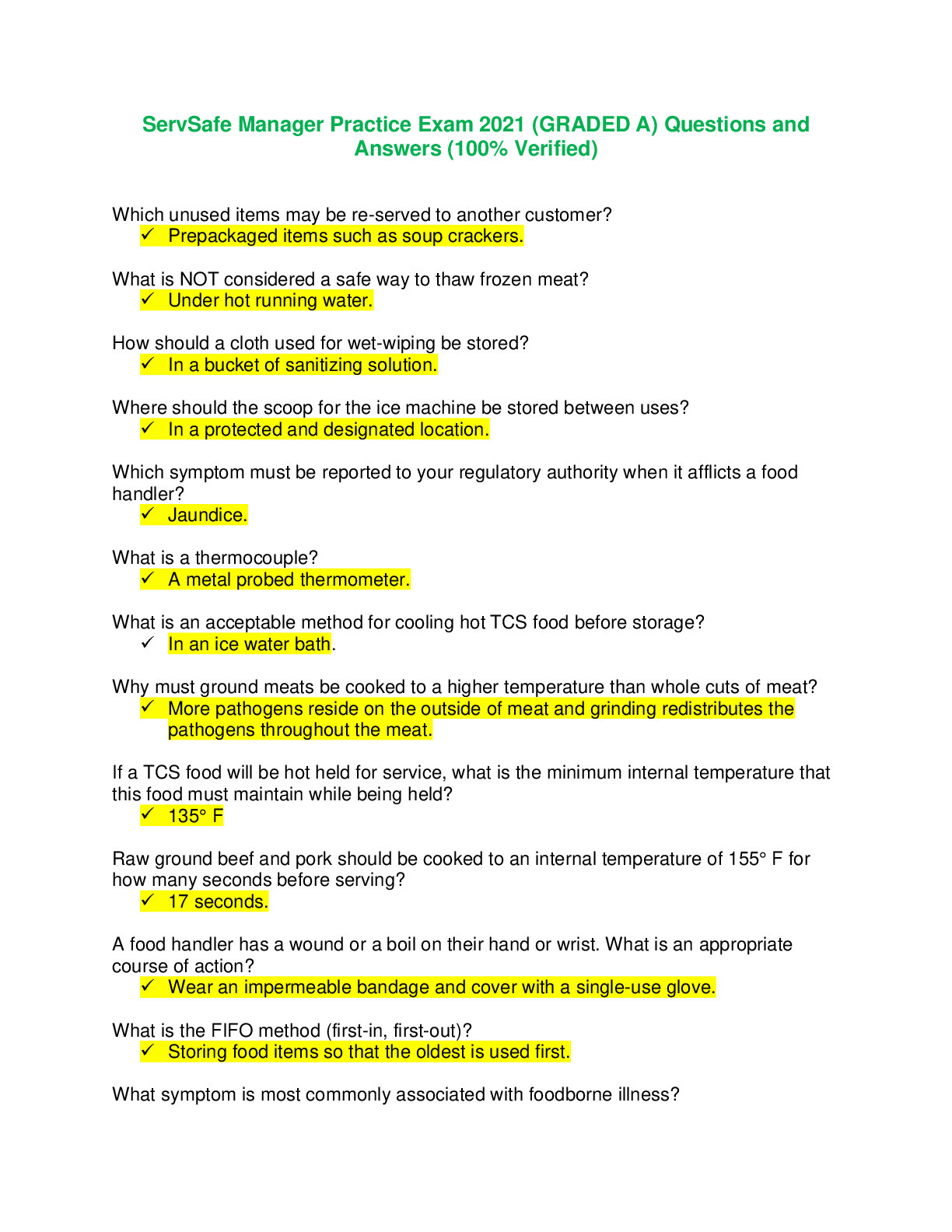
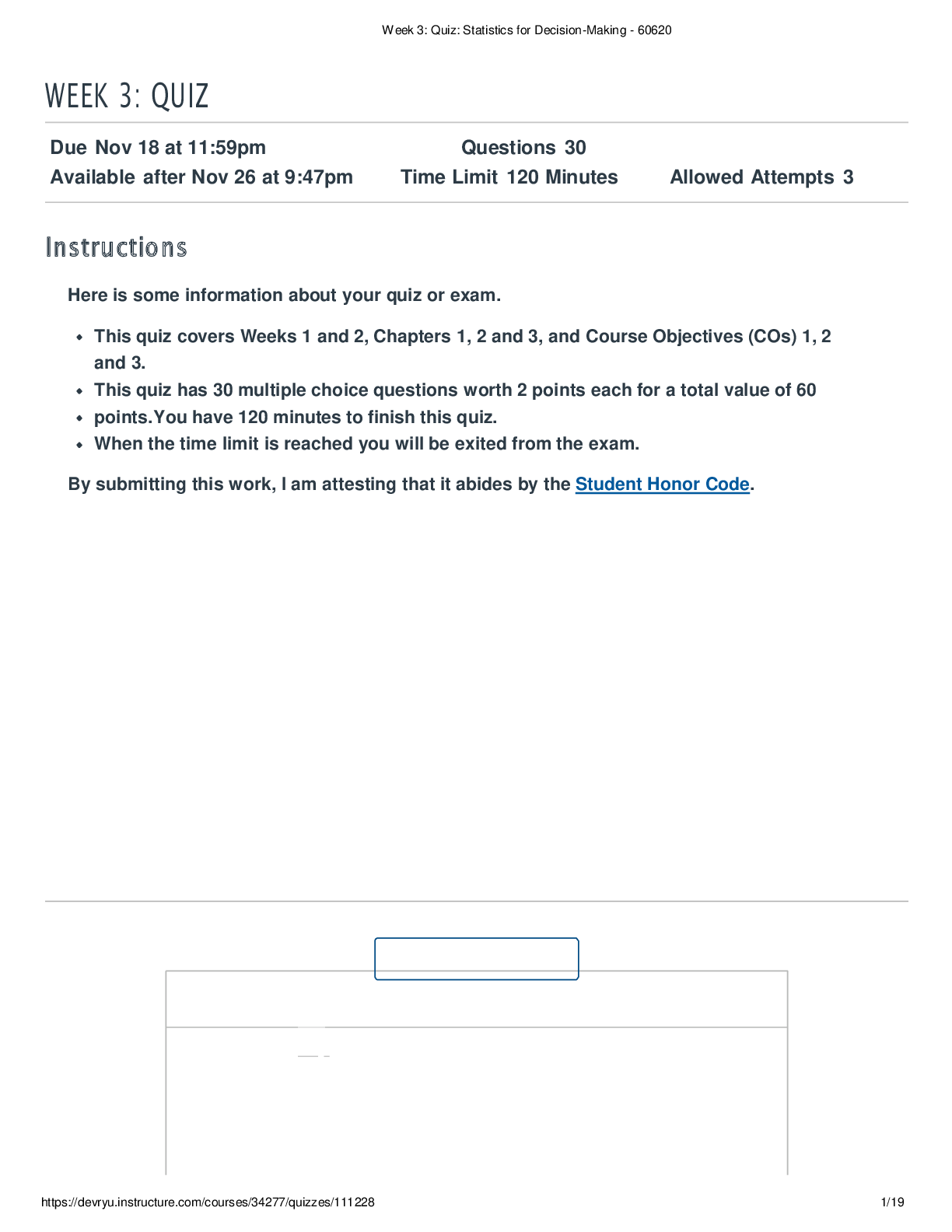
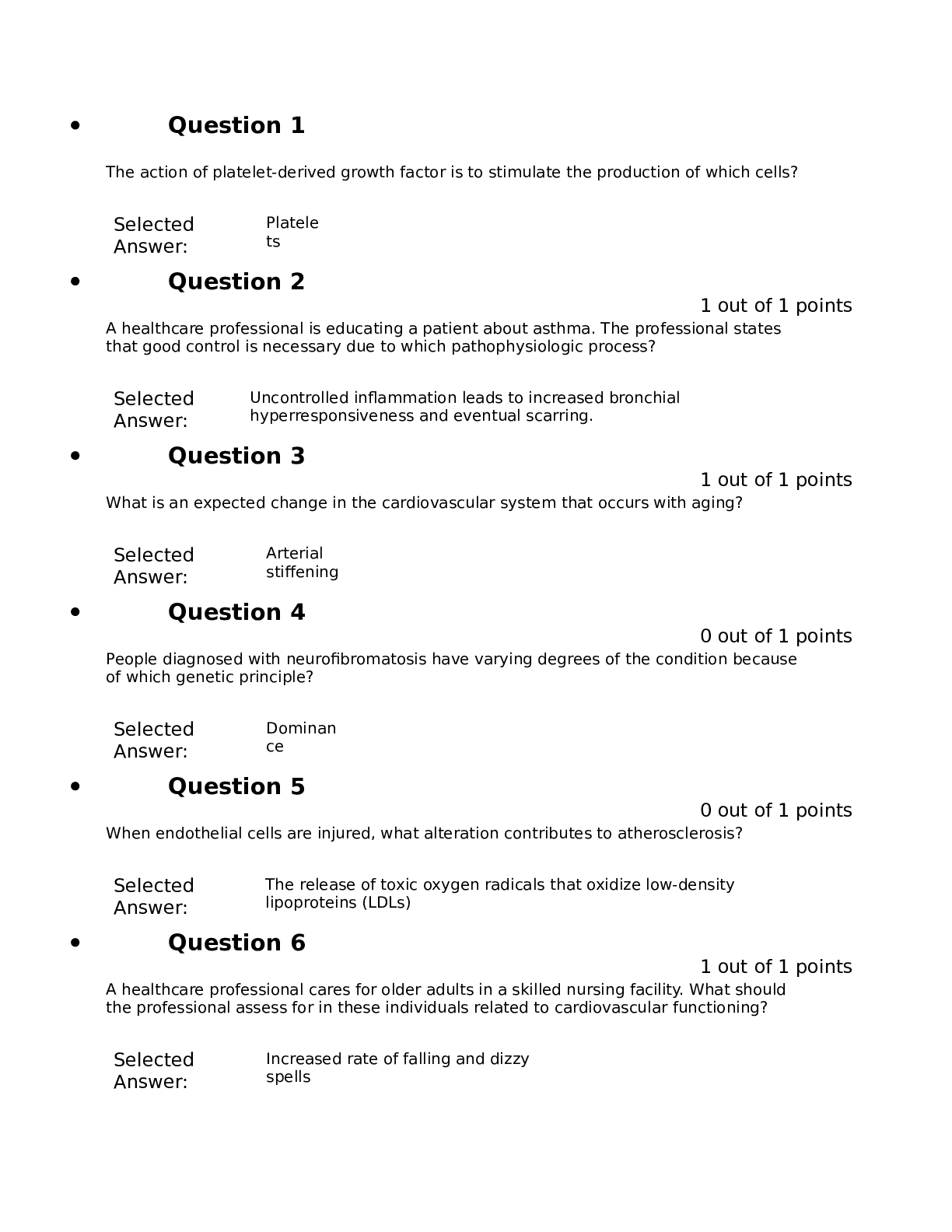
.png)
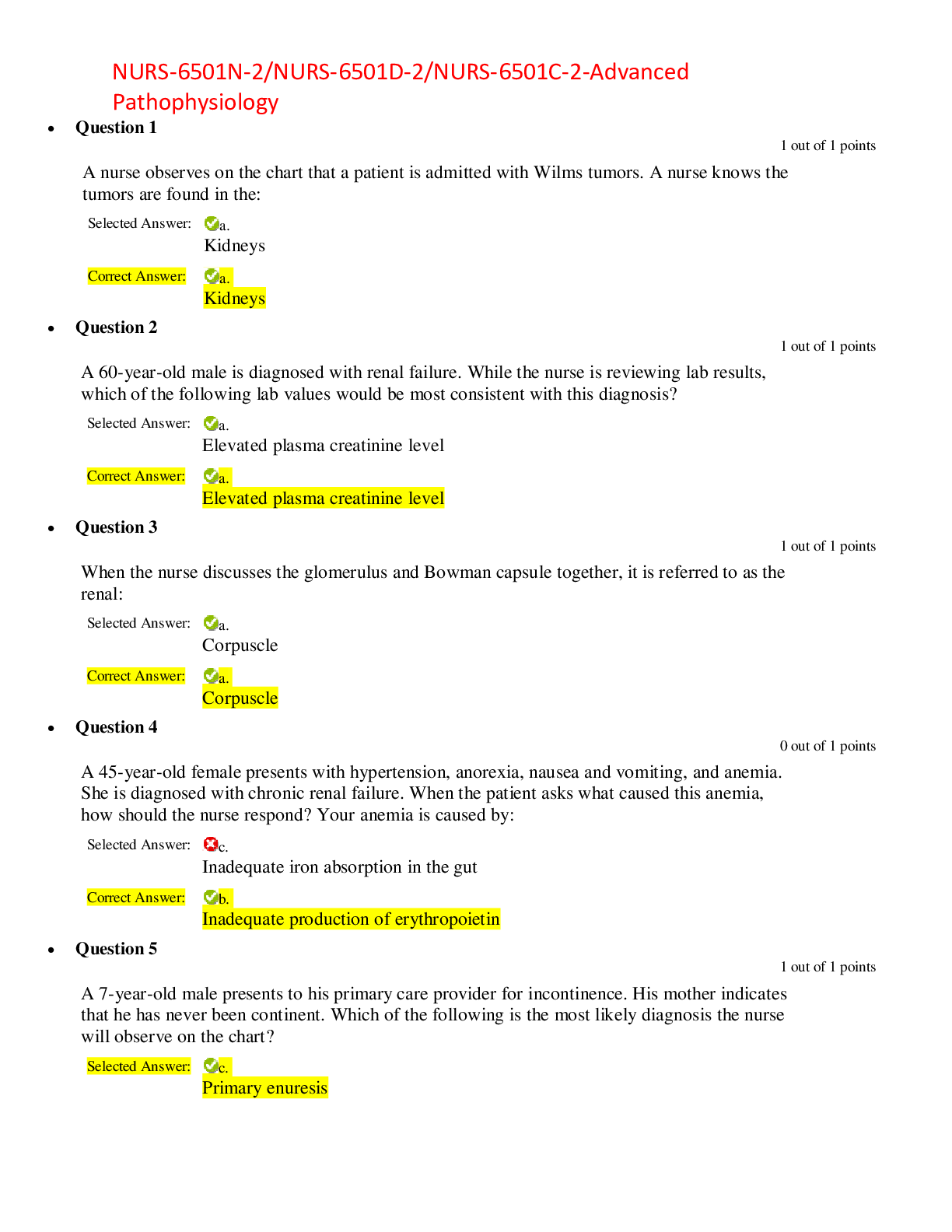
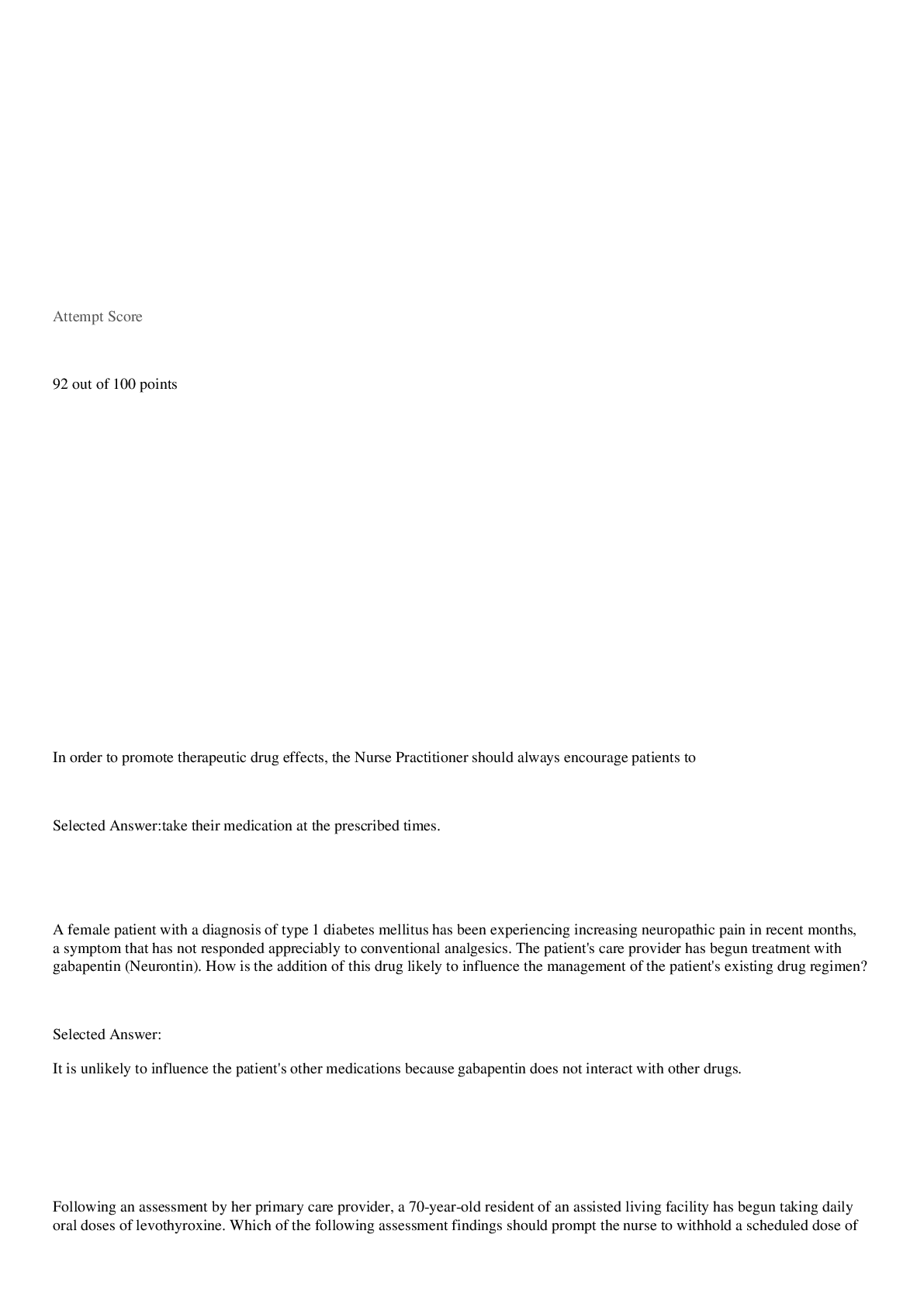
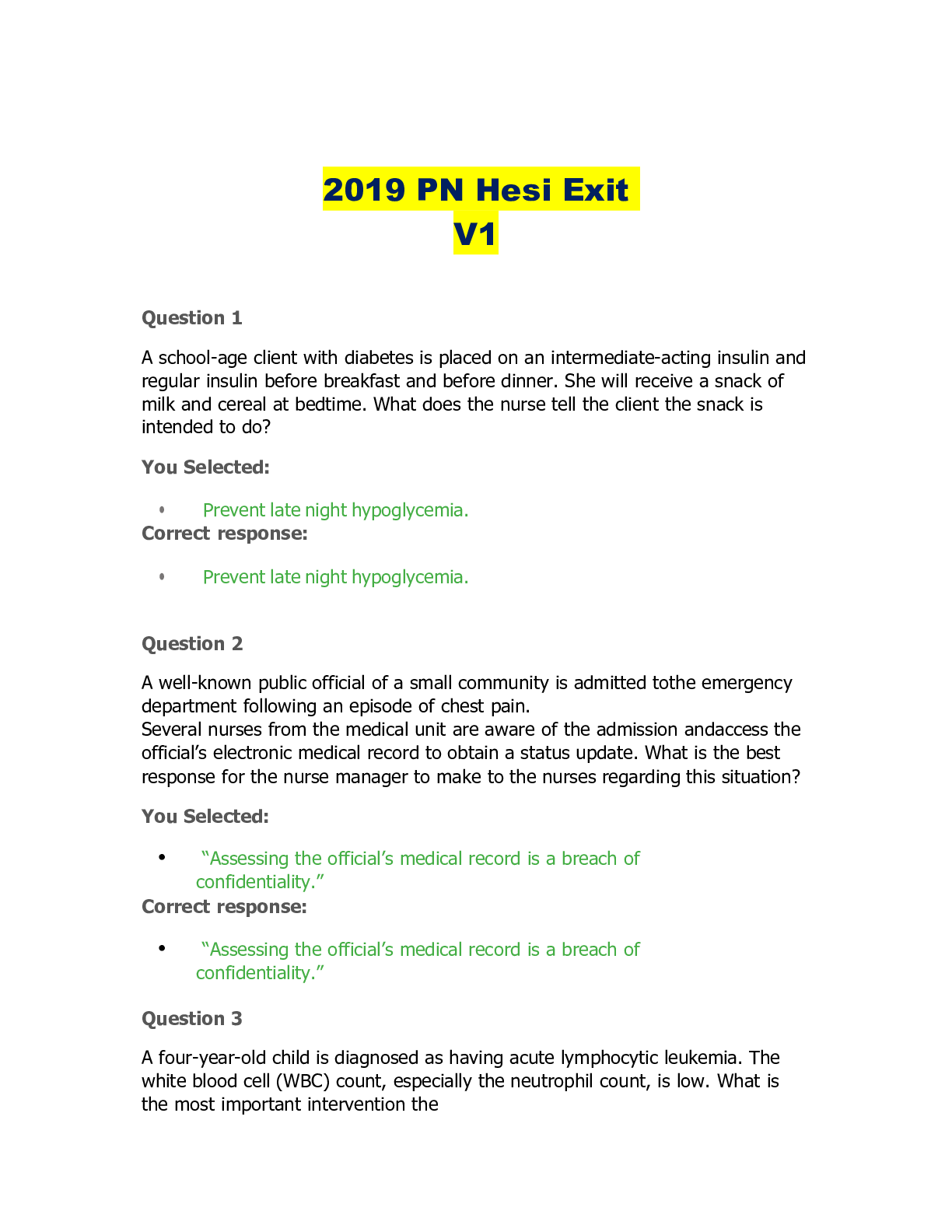
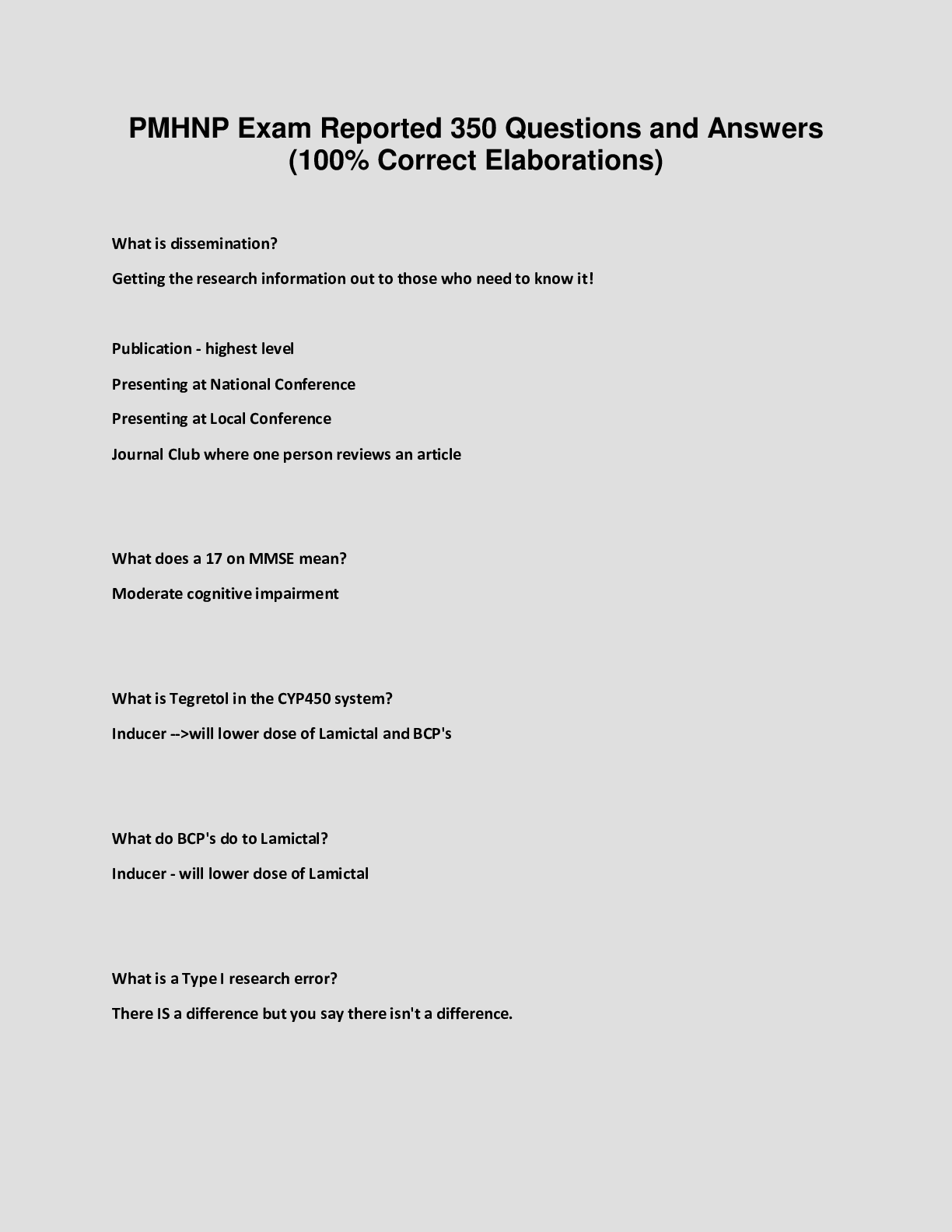
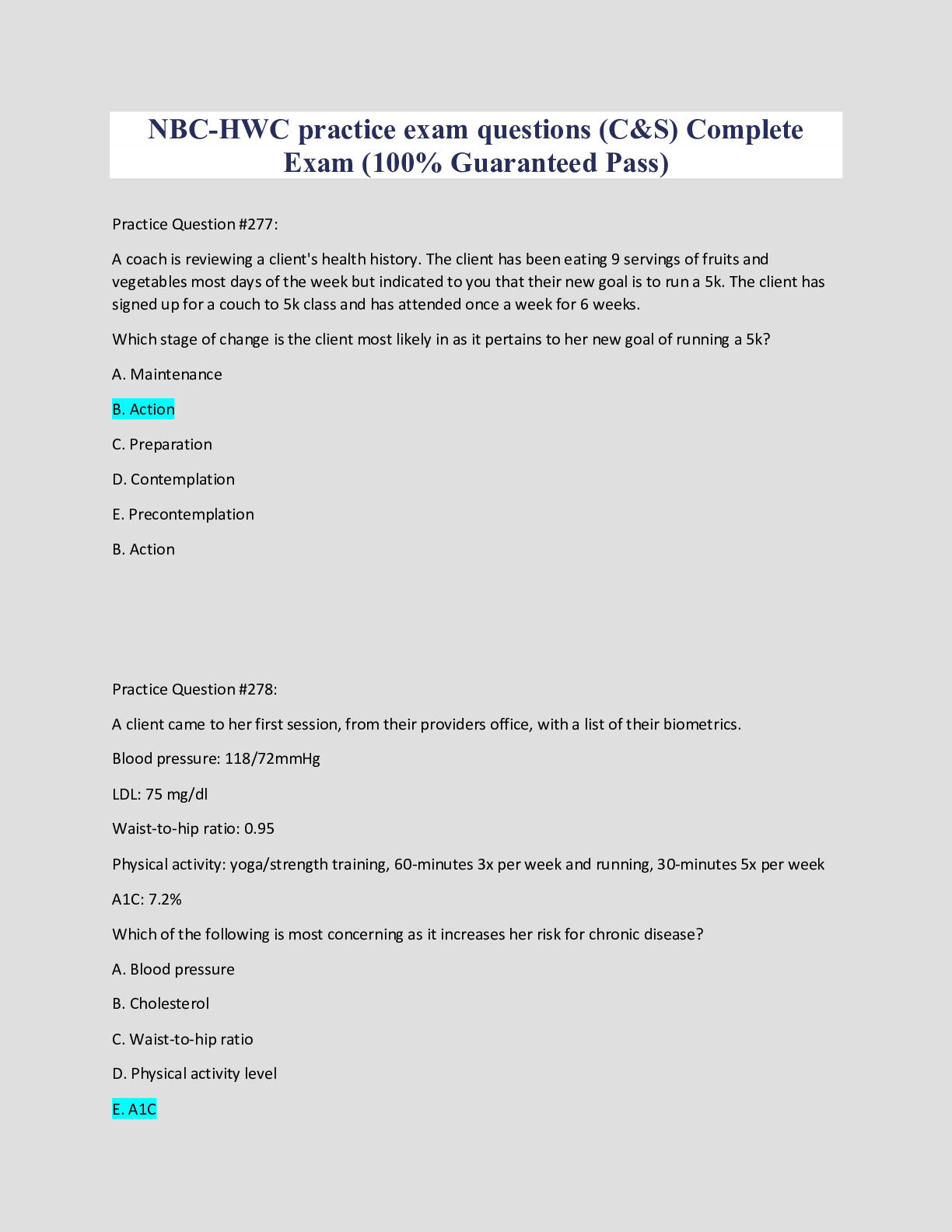
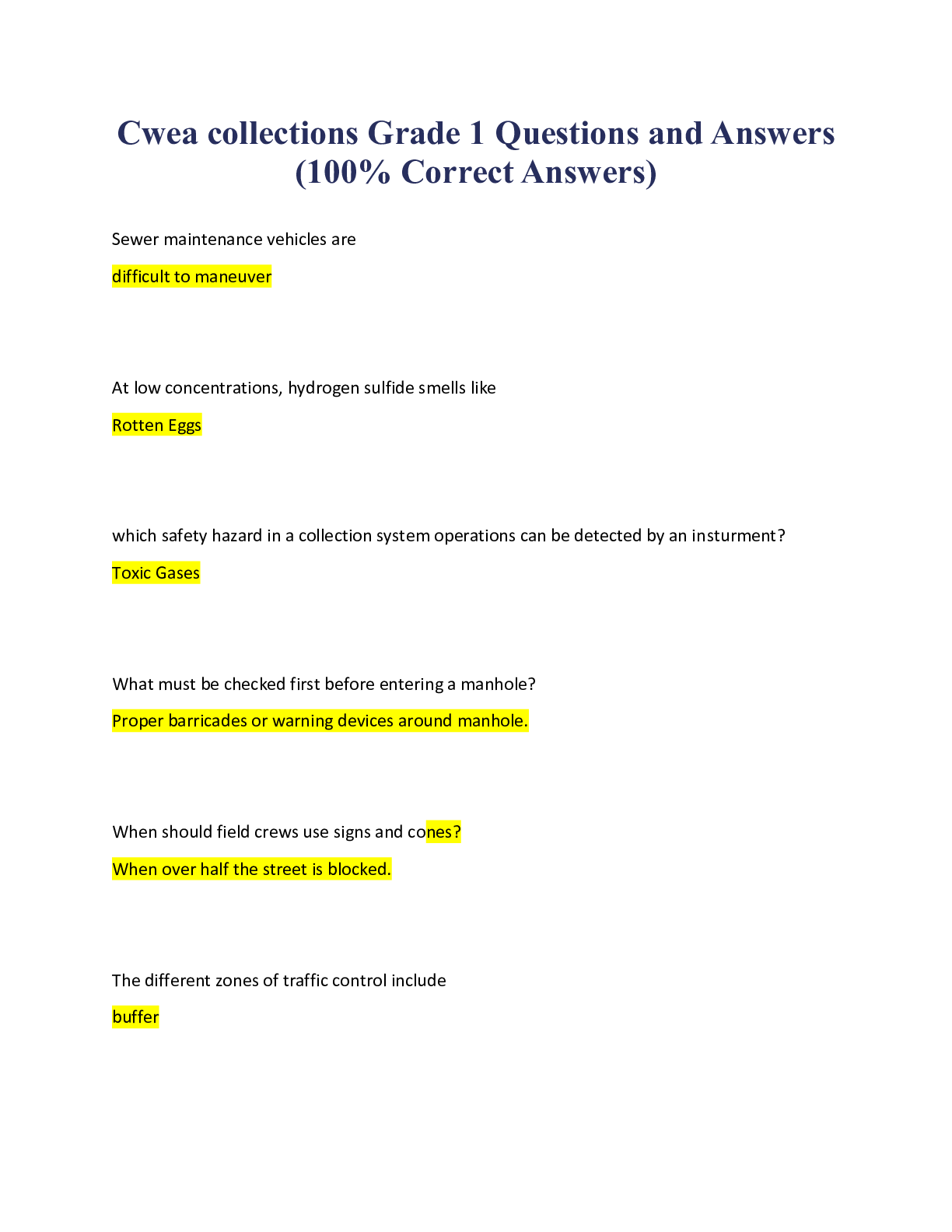
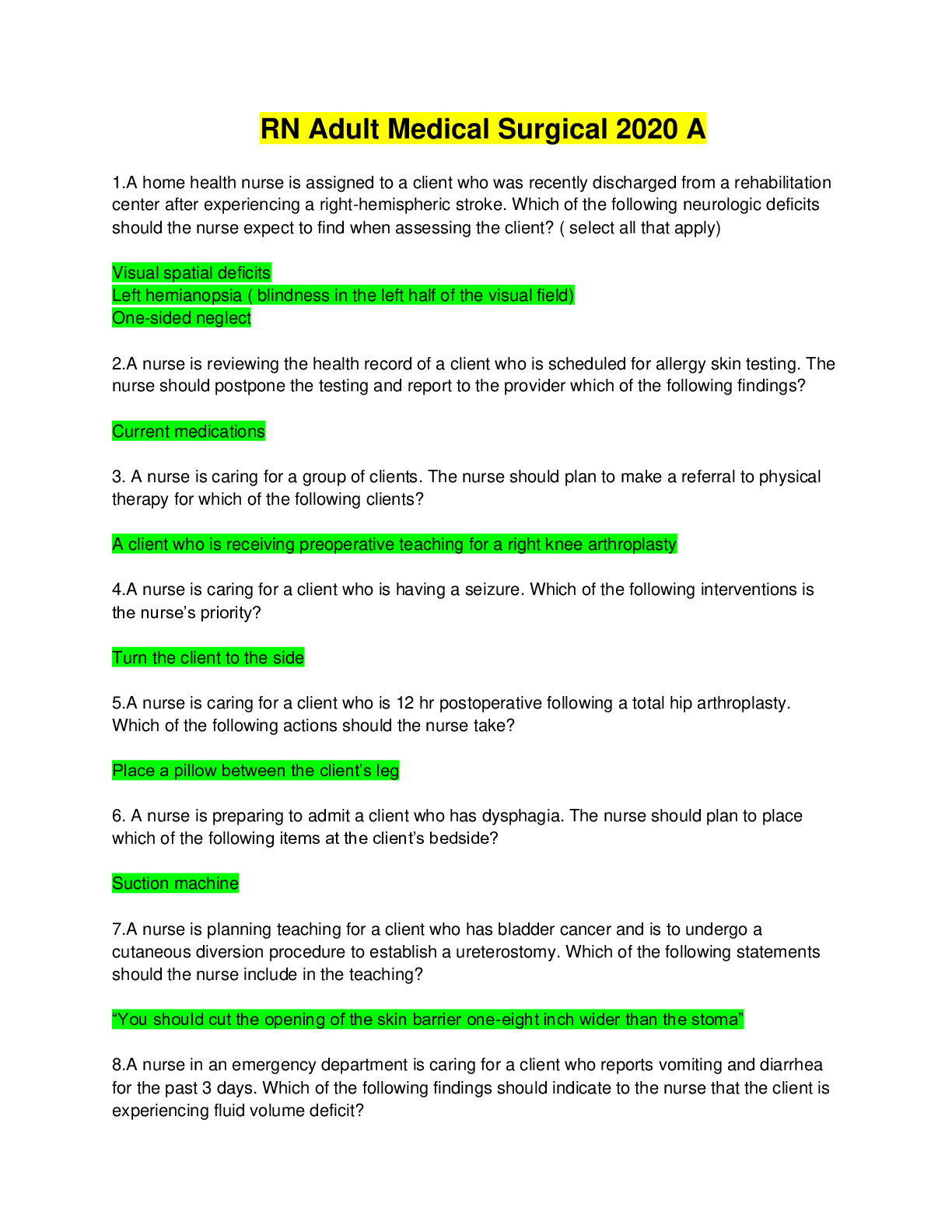
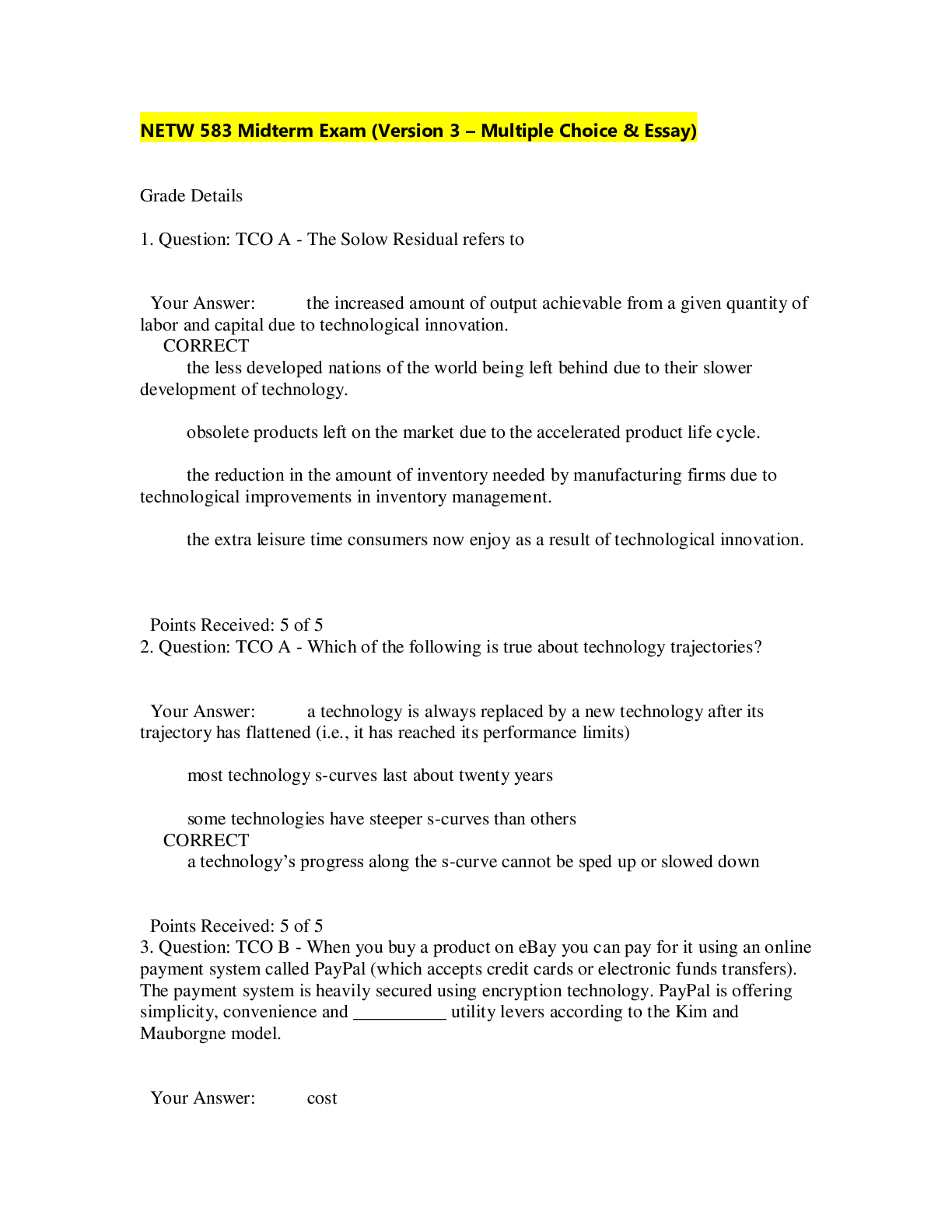
.png)
